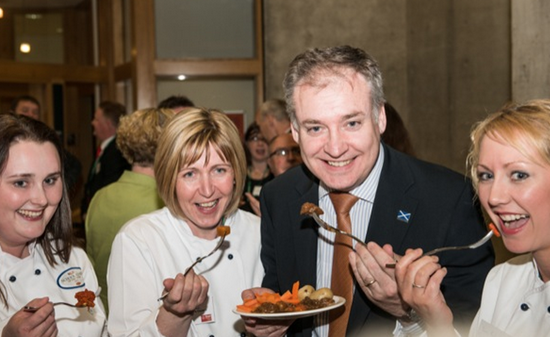
The European Union (EU) set three objectives for 2020 known as the 20-20-20. This PR gimmick promises a 20% reduction in EU greenhouse gas emissions from 1990 levels, a raise in the share of EU energy consumption produced from renewable resources to 20%, and a 20% improvement in the EU’s energy efficiency. No commitment was made however to reduce its role in the unnecessary global trade web of food products. An analysis of the Britain’s food trade with other EU nations highlights the utter disregard for the planet by capitalists, particularly those of imperialist countries. While the concept of ‘food miles’ is widely discredited as being too simplistic to be useful for determining environmental damage through greenhouse gas emissions, the figures of imports and exports, between countries for the purpose of food as a commodity, indicate an unnecessary and destructive trade web – rational only under the anarchic logic of capitalism.
Britain’s biggest food export is salmon – worth £500m in 2014. The vast majority of British salmon is farmed. Salmon farming is harmful to aquatic ecosystems: it spreads disease, parasites and chemical contamination to wildlife; wild fish stocks are used as feed, which outweighs the salmon yield; escaped farmed salmon interbreed with wild salmon; and it concentrates salmon faeces and food waste. The latest official trade figures show that in 2013 Britain exported 111,293 tonnes of highly priced Scottish salmon and imported 69,328 tonnes of cheaper Scandinavian salmon. The official import/export figures show that in 2013 British salmon exports to Germany were 2,194 tons and imports from Germany were 2,298 tons. Germany imports all of its Atlantic salmon, mostly from Norway and then exports it to other countries.
Capitalist food production is extremely water intensive. According to the UN Food and Agriculture Organisation, 70% of the Earth’s fresh water available for human use is currently used for food production. With the global population predicted to reach 10 billion in 2050, this is completely unsustainable. Water is often added to food to bulk it up, for example via the process known as tumbling, in which meat (particularly chicken) is churned in a giant cement mixer-like vat with salt and water until all the water and salt has been absorbed. The Netherlands is considered to be the global centre of tumbling – figures from the Agriculture and Horticulture Development Board show that the Netherlands topped both the import and export tables for British poultry every year between 2009-2013. According to the Head of Computational Science at Microsoft Research, Professor Stephen Emmott, it takes 9,000 litres of water to produce a chicken, 3,000 litres to produce a burger and four litres to produce a one litre bottle of water.
Another common practice in meat production is the overuse of antibiotics as both a growth stimulant – as it kills competing bacteria in the animal’s gut allowing it to absorb more food more quickly – and a way to prevent infection. Due to overuse, antibiotics – some of which are related to human antibiotics – have become increasingly less effective, meaning animal sheds are incubating drug-resistant strains of bacteria such as MRSA. These can infect humans as highlighted by a recent documentary by The Guardian, ‘The pig superbug and the baby’, which documents the spreading of MRSA CC398 from Danish pigs to pork on major British supermarket shelves and British pig stocks, and ultimately to humans.
British supermarkets sell fresh fruit and vegetables that were once considered seasonal, all year round. They do this through a combination of domestic production during summer months and a reliance on imported products during winter. Spain has been key to the production of salad vegetables, and this has taken a massive toll on Spain’s soil and water supply. Felicity Lawrence in her 2004 book Not on the label recounts a conversation with Manuel Ariza the then chief of agri-environment for the Spanish Agricultural Ministry in which he stated: ‘This intensive vegetable production is not sustainable, we will have to switch back to rotating crops … You can’t go on doing that, taking three or four crops a year from soil. Over time the exploitation of the land will shift. Mediterranean vegetables will move to the Maghreb [North African countries west of Egypt] where laws are less stringent – European countries have already started investing there, it’s cheaper and there is still beautiful land there. We’ll grow more organic and farm more extensively. There’ll be warranties against pesticide residues from outside of the EU – we’ll test more and reject produce with pesticide residues, so it will be safe – but no warranties for the environment.’
EU statistics show imports of tomatoes from Morocco have increased from 197,950 tons in 2003/2004 to 359,291 tons in 2012/2013 while the Tunisian tomato import figures increased ten times from 1,846 tons in 2003/2004 to 10,845 in 2010/2011. According to the Confederation of British Industries (CBI): ‘Fresh fruit and vegetables are one of the most important categories in European supermarkets… Germany, the United Kingdom, France and The Netherlands are the biggest importers of fresh fruit and vegetables from developing countries. The Netherlands is a major trade hub for fresh produce from developing countries.’ The CBI’s statistics display Morocco as having by far the biggest exports into Britain of vegetables amongst developing countries in 2013 with 30% followed by Egypt with 9%. The statistics show an increasing move by Britain among other European imperialists towards production in Africa, as their exploitation exhausts Spanish soil quality and water supply.
The wasteful production of food as a commodity can only be halted if the capitalist system, which has gone long beyond its useful life, is destroyed. As socialists we fight to replace it with a planned economy, based on human need. The greed of capitalist markets and the system’s need for constant expansion mean it cannot be reformed and as a result it can never adequately protect the environment from the harm caused by the pursuit of profit.
Cal Shaw
FRFI 246 August/September2015




